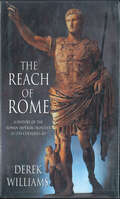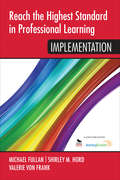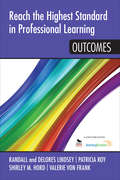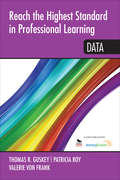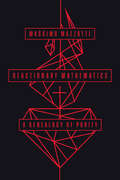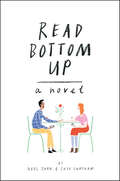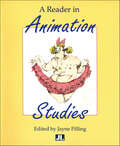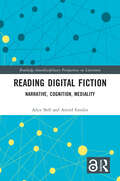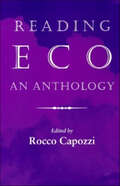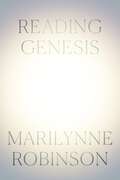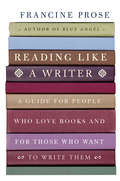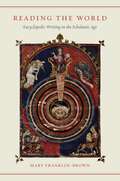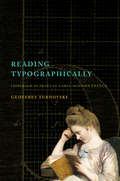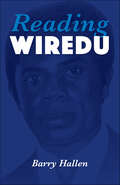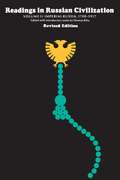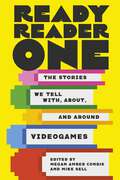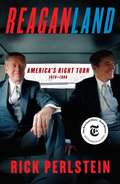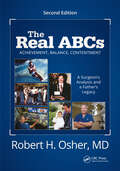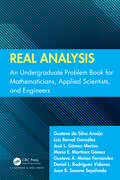- Table View
- List View
The Reach of Rome: A History of the Roman Imperial Frontier, 1st–5th Centuries AD
by Derek WilliamsThe Roman Empire was one of the most powerful forces in history. However, few people realize that this vast empire was guarded by one frontier, a series of natural and man-made barriers, including Hadrian's Wall. It is impossible to have a true understanding of the Roman Empire without first investigating the scope of this amazing frontier.The boundary ran for roughly 4,000 miles--from Britain to Morocco via the Rhine, the Danube, the Euphrates, the Syrian Desert, and the Saharan fringes; reinforced by walls, ditches, palisades, watchtowers, and forts. It absorbed virtually the whole imperial army, enclosed three and a half million square miles, and defended forty provinces (now thirty countries) and perhaps eighty million Roman subjects. In protecting the empire the frontier made a substantial contribution to the Pax Romana and ultimately to preserving the inheritance of future Europe. Yet this static mode of defense ran counter to Rome's tradition of mobile warfare and her taste for glory, born of centuries of conquest. The emperors' choice of a passive strategy promoted lassitude and conservatism, allowing the military initiative slowly to pass into barbarian hands.The Reach of Rome is the first book to describe the entire length of the amazing imperial frontier. It traces the political forces that created it and portrays those who commanded and manned it, as well as those against whom it was held. It relates the frontier's rise, pre-eminence, crises, and collapse and assesses its meaning for history and its legacies to the post-Roman world. Finally, it also tells the story of the explorers who rediscovered its lost works and describes the nature and location of the surviving remains. Includes thirty beautifully designed maps.
Reach the Highest Standard in Professional Learning: Implementation
by Michael Fullan Shirley M. Hord Valerie Von FrankImplementation IS Effective professional learning! Learning Forward is a leader in understanding and advancing professional learning that leads to student success. This series explores Learning Forward’s seven Standards for Professional Learning, which outline the characteristics of effective professional learning that, collectively, advance teaching and learning. In this volume, you’ll get original essays, an inspirational case study, and detailed guidance on "implementing the implementation standard." Deepen your knowledge of the standards and learn how to: Use professional learning as a powerful lever for long-term change Invest in human and social capital to promote school-wide success through an original "think piece" by Michael Fullan Connect the standards to your site-specific needs Discover what it takes to implement lasting, high-impact professional learning and practice. This expert resource will show you how!
Reach the Highest Standard in Professional Learning: Implementation
by Michael Fullan Shirley M. Hord Valerie Von FrankImplementation IS Effective professional learning! Learning Forward is a leader in understanding and advancing professional learning that leads to student success. This series explores Learning Forward’s seven Standards for Professional Learning, which outline the characteristics of effective professional learning that, collectively, advance teaching and learning. In this volume, you’ll get original essays, an inspirational case study, and detailed guidance on "implementing the implementation standard." Deepen your knowledge of the standards and learn how to: Use professional learning as a powerful lever for long-term change Invest in human and social capital to promote school-wide success through an original "think piece" by Michael Fullan Connect the standards to your site-specific needs Discover what it takes to implement lasting, high-impact professional learning and practice. This expert resource will show you how!
Reach the Highest Standard in Professional Learning: Outcomes
by Shirley M. Hord Delores B. Lindsey Randall B. Lindsey Valerie Von FrankProfessional development that increases educator effectiveness and student success! Learning Forward is a leader in understanding and advancing professional learning that leads to student success. This series explores Learning Forward’s seven Standards for Professional Learning which outline the characteristics of effective professional learning that, collectively, advance teaching and learning. This volume gives teachers and administrators a detailed roadmap for implementing the Outcomes standard. Deepen you knowledge of this standard with: An original essay by Delores B. Lindsey and Randall B. Lindsey on using the lens of Cultural Proficiency to highlight the theme of educational equity that is embedded in the standard Practical tools that guide leaders in finding coherence between performance standards for educators and curriculum standards for students A powerful case study to illustrate how the standard was enacted across a major urban school district With this book, educators will reach new heights in professional growth and students will reap the benefits!
Reach the Highest Standard in Professional Learning: Outcomes
by Shirley M. Hord Delores B. Lindsey Randall B. Lindsey Valerie Von FrankProfessional development that increases educator effectiveness and student success! Learning Forward is a leader in understanding and advancing professional learning that leads to student success. This series explores Learning Forward’s seven Standards for Professional Learning which outline the characteristics of effective professional learning that, collectively, advance teaching and learning. This volume gives teachers and administrators a detailed roadmap for implementing the Outcomes standard. Deepen you knowledge of this standard with: An original essay by Delores B. Lindsey and Randall B. Lindsey on using the lens of Cultural Proficiency to highlight the theme of educational equity that is embedded in the standard Practical tools that guide leaders in finding coherence between performance standards for educators and curriculum standards for students A powerful case study to illustrate how the standard was enacted across a major urban school district With this book, educators will reach new heights in professional growth and students will reap the benefits!
Reach the Highest Standard in Professional Learning: Data
by Patricia Roy Thomas R. Guskey Valerie Von FrankWhen teachers use data effectively, students see results. Learning Forward is a leader in understanding and advancing professional learning that leads to student success. This series explores Learning Forward’s seven Standards for Professional Learning, which outline the characteristics of effective professional learning. In this volume, the authors explore the crucial function of data for designing, implementing, and evaluating professional learning. The book’s features include: An original "think piece" by Thomas Guskey on using data in deliberate and thoughtful ways in the context of professional learning Specific implementation strategies that focus on analyzing student, educator, and system data and assessing progress A detailed case study of one district’s journey to successful use of data and how it led to measurable improvement in student achievement Learning to collect, analyze and use data is an essential component of professional development. When schools are able to make data work for them, students are the ones who benefit.
Reach the Highest Standard in Professional Learning: Data
by Patricia Roy Thomas R. Guskey Valerie Von FrankWhen teachers use data effectively, students see results. Learning Forward is a leader in understanding and advancing professional learning that leads to student success. This series explores Learning Forward’s seven Standards for Professional Learning, which outline the characteristics of effective professional learning. In this volume, the authors explore the crucial function of data for designing, implementing, and evaluating professional learning. The book’s features include: An original "think piece" by Thomas Guskey on using data in deliberate and thoughtful ways in the context of professional learning Specific implementation strategies that focus on analyzing student, educator, and system data and assessing progress A detailed case study of one district’s journey to successful use of data and how it led to measurable improvement in student achievement Learning to collect, analyze and use data is an essential component of professional development. When schools are able to make data work for them, students are the ones who benefit.
Reactionary Mathematics: A Genealogy of Purity
by Massimo MazzottiA forgotten episode of mathematical resistance reveals the rise of modern mathematics and its cornerstone, mathematical purity, as political phenomena. The nineteenth century opened with a major shift in European mathematics, and in the Kingdom of Naples, this occurred earlier than elsewhere. Between 1790 and 1830 its leading scientific institutions rejected as untrustworthy the “very modern mathematics” of French analysis and in its place consolidated, legitimated, and put to work a different mathematical culture. The Neapolitan mathematical resistance was a complete reorientation of mathematical practice. Over the unrestricted manipulation and application of algebraic algorithms, Neapolitan mathematicians called for a return to Greek-style geometry and the preeminence of pure mathematics. For all their apparent backwardness, Massimo Mazzotti explains, they were arguing for what would become crucial features of modern mathematics: its voluntary restriction through a new kind of rigor and discipline, and the complete disconnection of mathematical truth from the empirical world—in other words, its purity. The Neapolitans, Mazzotti argues, were reacting to the widespread use of mathematical analysis in social and political arguments: theirs was a reactionary mathematics that aimed to technically refute the revolutionary mathematics of the Jacobins. During the Restoration, the expert groups in the service of the modern administrative state reaffirmed the role of pure mathematics as the foundation of a newly rigorous mathematics, which was now conceived as a neutral tool for modernization. What Mazzotti’s penetrating history shows us in vivid detail is that producing mathematical knowledge was equally about producing certain forms of social, political, and economic order.
Read Bottom Up: A Novel
by Neel Shah Skye ChathamA charming novel about falling in love (or like) in the digital age—the never-before-seen full story.Madeline and Elliot meet at a New York City restaurant opening. Flirtation—online—ensues. A romance, potentially eternal, possibly doomed, begins.And, like most things in life today, their early exchanges are available to be scrutinized and interpreted by well-intentioned friends who are a mere click away.Madeline and Elliot's relationship unfolds through a series of thrilling, confounding, and funny exchanges with each other, and, of course, with their best friends and dubious confidants (Emily and David). The result is a brand-new kind of modern romantic comedy, in format, in content, and even in creation—the authors exchanged e-mails in real time, blind to each other's side conversations. You will nod in appreciation and roll your eyes in recognition; you'll learn a thing or two about how the other half approaches a new relationship . . . and you will cheer for an unexpected ending that just might restore your faith in falling in love, twenty-first-century style.
A Reader in Animation Studies
by Jayne PillingCartoons—both from the classic Hollywood era and from more contemporary feature films and television series—offer a rich field for detailed investigation and analysis. Contributors draw on theories and methodology from film, television, and media studies, art history and criticism, and feminism and gender studies.
Reading Digital Fiction: Narrative, Cognition, Mediality (Routledge Interdisciplinary Perspectives on Literature)
by Astrid Ensslin Alice BellReading Digital Fiction offers the first comprehensive and systematic theoretical, methodological, and analytical examination of digital fiction from a cognitive and empirical perspective. Proposing the new concept of “medial reading”, it argues for the centrality of an audience’s interest in, awareness of and/or attention to the medium in which a text is produced and received, and which we argue should be applied to reader data across media. The book analyses and theorises five generations of digital fiction and their reading including hypertext fiction, hypermedia fiction, narrative video games, app fiction, and virtual reality. It showcases medium- and platform-specific methods of qualitative reader response research across a variety of contexts and settings from screen-based and embodied interaction to gallery installation, and from reading group and individual interview to think-aloud methodologies. The book thus addresses the unique affordances of digital fiction reading by designing and reporting on new empirical studies focusing on hypertextuality, interactivity, immersion, as well as medium-specific forms of textual “you”, ontological ambiguity, reader orientation and empathy. In so doing, the book refines, critiques, and expands cognitive, transmedial, and empirical narratology and stylistics by placing the reader of these new narratives front and centre.The Open Access version of this book, available at http://www.taylorfrancis.com, has been made available under a Creative Commons [Attribution-Non Commercial-No Derivatives (CC-BY-NC-ND)] 4.0 license.
Reading Eco: An Anthology (Advances in Semiotics)
by Rocco Capozzi"[READING ECO is a timely indication] of the fruitfulness of perceiving Eco as the same in his metamorphoses. [It also testifies] to a certain price that Eco and his readers must/may pay for the enormous pleasure and intellectual stimulus of being Eco and being with Eco." —The ComparatistUmberto Eco is, quite simply, a genius. He is a renowned medievalist, philosopher, novelist, a popular journalist, and linguist. He is as warm and witty as he is learned—and quite probably the best-known academic and novelist in the world today. The goal of this anthology is to examine his ideas of literary semiotics and interpretation as evidenced both in his scholarly work and in his fiction.
Reading Genesis
by Marilynne RobinsonINSTANT NEW YORK TIMES BESTSELLEROne of our greatest novelists and thinkers presents a radiant, thrilling interpretation of the book of Genesis.For generations, the book of Genesis has been treated by scholars as a collection of documents by various hands, expressing different factional interests, with borrowings from other ancient literatures that mark the text as derivative. In other words, academic interpretation of Genesis has centered on the question of its basic coherency, just as fundamentalist interpretation has centered on the question of the appropriateness of reading it as literally true.Both of these approaches preclude an appreciation of its greatness as literature, its rich articulation and exploration of themes that resonate through the whole of Scripture. Marilynne Robinson’s Reading Genesis, which includes the full text of the King James Version of the book, is a powerful consideration of the profound meanings and promise of God’s enduring covenant with humanity. This magisterial book radiates gratitude for the constancy and benevolence of God’s abiding faith in Creation.
Reading Like a Writer: A Guide for People Who Love Books and for Those Who Want to Write Them
by Francine ProseA distinguished novelist and critic inspires readers and writers with this inside look at how the professionals read—and write Long before there were creative writing workshops and degrees, how did aspiring writers learn to write? By reading the work of their predecessors and contemporaries, says Francine Prose. As she takes us on a guided tour of the tools and the tricks of the masters—Dostoyevsky, Flaubert, Kafka, Austen, Dickens, Woolf, Chekhov—Prose discovers why these writers endure. She takes pleasure in the signature elements of such outsatanding writers as Philip Roth, Isaac Babel, John Le Carré, James Joyce, and Katherine Mansfield. Throughout, she cautions readers to slow down and pay attention to words, the raw material out of which literature is crafted. Written with passion, humor, and wisdom, Reading Like a Writer will inspire readers to return to literature with a fresh eye and an eager heart.
Reading the World: Encyclopedic Writing in the Scholastic Age
by Mary Franklin-BrownThe thirteenth century saw such a proliferation of new encyclopedic texts that more than one scholar has called it the “century of the encyclopedias.” Variously referred to as a speculum, thesaurus, or imago mundi—the term encyclopedia was not commonly applied to such books until the eighteenth century—these texts were organized in such a way that a reader could easily locate a collection of authoritative statements on any given topic. Because they reproduced, rather than simply summarized, parts of prior texts, these compilations became libraries in miniature. In this groundbreaking study, Mary Franklin-Brown examines writings in Latin, Catalan, and French that are connected to the encyclopedic movement: Vincent of Beauvais’s Speculum maius; Ramon Llull’s Libre de meravelles, Arbor scientiae, and Arbre de filosofia d’amor; and Jean de Meun’s continuation of the Roman de la Rose. Franklin-Brown analyzes the order of knowledge in these challenging texts, describing the wide-ranging interests, the textual practices—including commentary, compilation, and organization—and the diverse discourses that they absorb from preexisting classical, patristic, and medieval writing. She also demonstrates how these encyclopedias, like libraries, became “heterotopias” of knowledge—spaces where many possible ways of knowing are juxtaposed. But Franklin-Brown’s study will not appeal only to historians: she argues that a revised understanding of late medievalism makes it possible to discern a close connection between scholasticism and contemporary imaginative literature. She shows how encyclopedists employed the same practices of figuration, narrative, and citation as poets and romanciers, while much of the difficulty of the imaginative writing of this period derives from a juxtaposition of heterogeneous discourses inspired by encyclopedias. With rich and innovative readings of texts both familiar and neglected, Reading the World reveals how the study of encyclopedism can illuminate both the intellectual work and the imaginative writing of the scholastic age.
Reading Typographically: Immersed in Print in Early Modern France (Stanford Text Technologies)
by Geoffrey TurnovskyAnxieties about the fate of reading in the digital age reveal how deeply our views of the moral and intellectual benefits of reading are tied to print. These views take root in a conception of reading as an immersive activity, exemplified by the experience of "losing oneself in a book." Against the backdrop of digital distraction and fragmentation, such immersion leads readers to become more focused, collected, and empathetic. How did we come to see the printed book as especially suited to deliver this experience? Print-based reading practices have historically included a wide range of modes, not least the disjointed scanning we associate today with electronic text. In the context of religious practice, literacy's benefits were presumed to lie in such random-access retrieval, facilitated by indexical tools like the numbering of Biblical chapters and verses. It was this didactic, hunt-and-peck reading that bound readers to communities. Exploring key evolutions in print in 17th- and 18th-century France, from typeface, print runs, and format to punctuation and the editorial adaptation of manuscript and oral forms in print, this book argues that typographic developments upholding the transparency of the printed medium were decisive for the ascendancy of immersive reading as a dominant paradigm that shaped modern perspectives on reading and literacy.
Reading Wiredu (World Philosophies)
by Barry HallenReading Wiredu is the first comprehensive overview of the philosophical thought of Kwasi Wiredu. Born in Ghana in 1931, Wiredu, an important observer and critic of philosophy generally, remains an original and penetrating African thinker. Interrelating Wiredu's philosophical writings from across decades, Barry Hallen sets forth the basic tenets and the defining features of his philosophy. Wiredu's thought is divided into five distinct but interconnected areas: his response to the philosophy of Quine on issues of logic and ontology, issues of language in philosophical reflection, the nature of truth as a practical and philosophical concern, the principle of sympathetic impartiality that all human beings must live by to survive as a group, and finally, consensus building as rooted in intentional, negotiated, and rational exchanges that are part of everyday life. Reading Wiredu explores the scope and depth of Wiredu's philosophical thought, which can be framed through what he calls a genetic methodology—a methodology that privileges environmental considerations in the production of various forms of thought. Hallen's overview is intended to assist scholars and students in grasping Wiredu's complex philosophical thought.
Readings in Russian Civilization Volume II: Imperial Russia, 1700–1917 (None Ser.)
by Thomas Riha"This new and enlarged version of Readings in Russian Civilization is the result of fairly extensive revisions. There are now 72 instead of 64 items; 20 of the selections are new. The first volume has undergone the least change with 3 new items, of which 2 appear in English for the first time. In the second volume there are 6 new items; all of them appear in English for the first time. The third volume has undergone the greatest revision, with 11 new items, of which 6 are newly translated from the Russian. It is the editor's hope that items left out in the new edition will not be sorely missed, and that the new selections will turn out to be useful and illuminating. The aim, throughout, has been to cover areas of knowledge and periods which had been neglected in the first edition, and to include topics which are important in the study of the Russian past and present. "The bibliographical headnotes have been enlarged, with the result that there are now approximately twice as many entries as in the old edition. New citations include not only works which have appeared since 1963, but also older books and articles which have come to the editor's attention."—From the Editor's Preface ". . . a judicious combination of seminal works and more recent commentaries that achieves the editor's purpose of stimulating curiosity and developing a point of view."—C. Bickford O'Brien, The Russian Review "These three volumes cover quite well the main periods of Russian civilization. The choice of the articles and other material is made by a competent and unbiased scholar."—Ivan A. Lopatin, Professor of Asian and Slavic Studies, University of Southern California
Ready Reader One: The Stories We Tell With, About, and Around Videogames
by Megan Amber Condis and Mike SellReady Reader One explores the many ways literature depicts, engages with, and imagines videogames and gamers. The diverse group of authors included in this collection take an expansive view of “videogame literature,” with essays that consider written works ranging from life writing to speculative fiction to videogame guides created for the internet. In an age of ever-increasing gamification, in which gaming literacy is important to understanding popular culture and technological power, Ready Reader One examines the role of videogame literature in explaining not only how we play videogames, but how we read and write about them.
Reaganland: America's Right Turn 1976-1980
by Rick PerlsteinA NEW YORK TIMES NOTABLE BOOK OF 2020 From the bestselling author of Nixonland and The Invisible Bridge comes the dramatic conclusion of how conservatism took control of American political power.Over two decades, Rick Perlstein has published three definitive works about the emerging dominance of conservatism in modern American politics. With the saga&’s final installment, he has delivered yet another stunning literary and historical achievement. In late 1976, Ronald Reagan was dismissed as a man without a political future: defeated in his nomination bid against a sitting president of his own party, blamed for President Gerald Ford&’s defeat, too old to make another run. His comeback was fueled by an extraordinary confluence: fundamentalist preachers and former segregationists reinventing themselves as militant crusaders against gay rights and feminism; business executives uniting against regulation in an era of economic decline; a cadre of secretive &“New Right&” organizers deploying state-of-the-art technology, bending political norms to the breaking point—and Reagan&’s own unbending optimism, his ability to convey unshakable confidence in America as the world&’s &“shining city on a hill.&” Meanwhile, a civil war broke out in the Democratic party. When President Jimmy Carter called Americans to a new ethic of austerity, Senator Ted Kennedy reacted with horror, challenging him for reelection. Carter&’s Oval Office tenure was further imperiled by the Iranian hostage crisis, the Soviet invasion of Afghanistan, near-catastrophe at a Pennsylvania nuclear plant, aviation accidents, serial killers on the loose, and endless gas lines. Backed by a reenergized conservative Republican base, Reagan ran on the campaign slogan &“Make America Great Again&”—and prevailed. Reaganland is the story of how that happened, tracing conservatives&’ cutthroat strategies to gain power and explaining why they endure four decades later.
The Real ABCs: A Surgeon's Analysis and a Father's Legacy
by Robert H. OsherIn The Real ABCs: A Surgeon’s Analysis and a Father’s Legacy, Second Edition, pioneering cataract surgeon Dr. Robert Osher reflects on his 40-year career and candidly shares that the secret to his professional success and personal happiness lies in the pursuit of “the real ABCs”—achievement, balance, and contentment.Dr. Osher was an internationally renowned surgeon and father of five when he was diagnosed with a pineapple-sized kidney cancer at age 53. Suddenly confronted with his own mortality, he resolved to write his legacy for his family, friends, and colleagues. The result is The Real ABCs, originally published after Dr. Osher’s successful recovery and newly updated with his experiences and wisdom of the last decade—an inspirational story of one man’s achievements as well as a prescriptive guide for finding balance and contentment.In The Real ABCs, Dr. Osher tells the story behind some of his accomplishments in ophthalmology, including the founding of the Cincinnati Eye Institute, the Cataract Surgery: Telling It Like It Is meeting, the Video Journal of Cataract and Refractive Surgery, and the introduction of groundbreaking techniques in cataract surgery. Dr. Osher demonstrates the importance of hard work and enthusiasm while admitting the inevitability of adversity and setbacks, acknowledging that his achievements wouldn’t be possible without the influence of his cherished teachers, mentors, friends, and family. Throughout the book, Osher also stresses the importance of seeking balance, whether it’s through nature, adventure, service, or adherence to one’s principles. The Real ABCs: A Surgeon’s Analysis and a Father’s Legacy, Second Edition is a deeply personal story filled with universal life lessons. Ultimately, Dr. Osher shows that approaching one’s career and personal life with passion and perseverance can help anyone attain a feeling of contentment and success.
Real Analysis: An Undergraduate Problem Book for Mathematicians, Applied Scientists, and Engineers
by Juan B. Seoane Sepúlveda Gustavo Da Araújo Luis Bernal González José L. Merino María E. Gómez Gustavo A. Fernández Daniel L. VidanesReal Analysis: An Undergraduate Problem Book for Mathematicians, Applied Scientists, and Engineers is a classical Real Analysis/Calculus problem book. This topic has been a compulsory subject for every undergraduate studying mathematics or engineering for a very long time. This volume contains a huge number of engaging problems and solutions, as well as detailed explanations of how to achieve these solutions. This latter quality is something that many problem books lack, and it is hoped that this feature will be useful to students and instructors alike. Features Hundreds of problems and solutions Can be used as a stand-alone problem book, or in conjunction with the author’s textbook, Real Analysis: An Undergraduate Textbook for Mathematicians, Applied Scientists, and Engineers, ISBN 9781032481487 Perfect resource for undergraduate students studying a first course in Calculus or Real Analysis Contains explanatory figures, detailed techniques, tricks, hints, and “recipes” on how to proceed once we have a calculus problem in front of us.
Real Book, Stage C, Getting Started 1: Stage C Getting Started Book 1 Student Edition 2023 (Read 180 Ser.)
by Houghton Mifflin HarcourtNIMAC-sourced textbook
